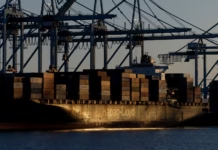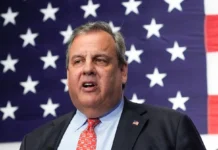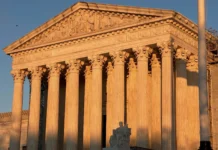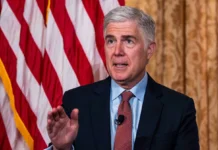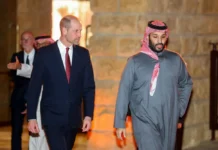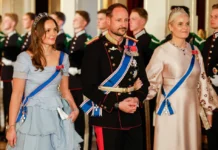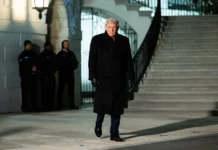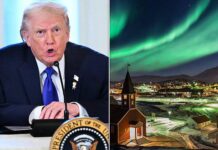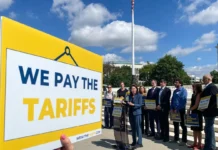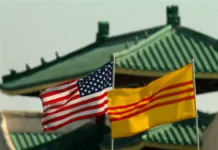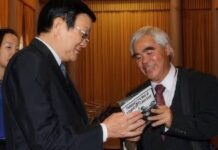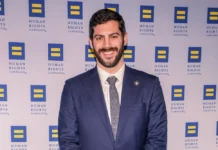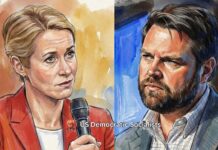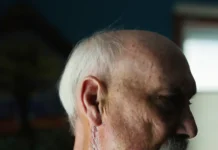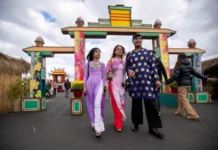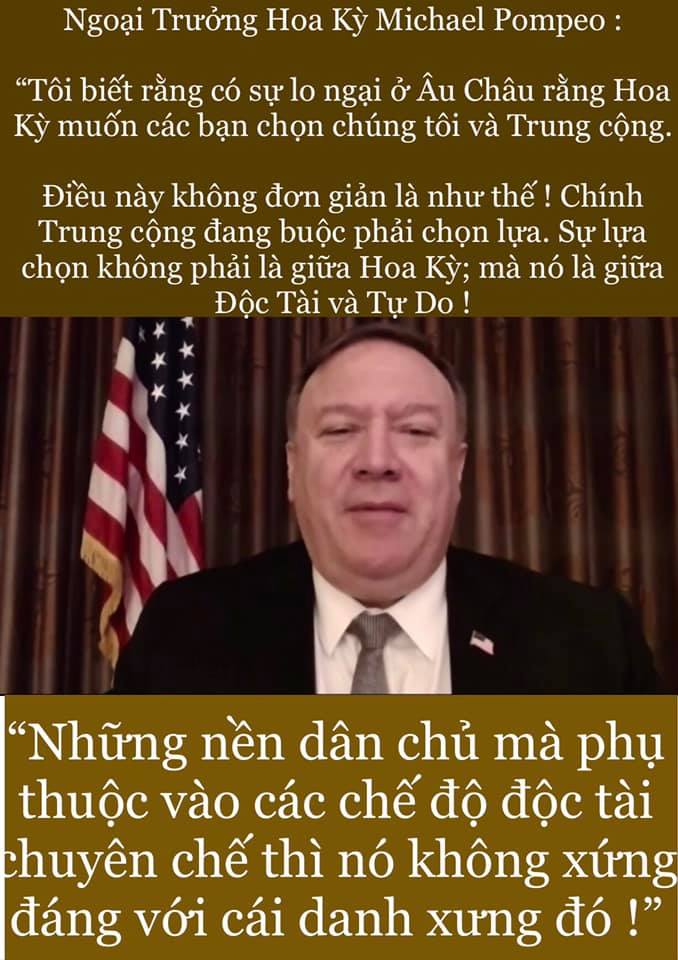SPEECH
MR RASMUSSEN: It’s a great pleasure for me to welcome our next speaker, the American Secretary of State, Mike Pompeo. Good morning, Mr. Secretary. I think it’s morning in your time zone.
I know you’ve been traveling from Hawaii where you met a high-ranking Chinese official. Earlier this year I listened to your speech at the security conference in Munich, and I enjoyed your upbeat message that the free world is winning. So we look very much forward to listening to you today. Please, join me in welcoming the 70th United States Secretary of State, Mike Pompeo.
SECRETARY POMPEO: Anders, thank you very much. Thanks for that warm greeting. It’s great to be with you all today, and hello to the Copenhagen Democracy Summit. It’s an honor to be with you and with Secretary General Rasmussen, a friend of freedom-loving people all across the world.
I don’t know if you all know this, but when it comes to strengthening transatlantic relations, Anders really walks the walk. His son and three beautiful grandchildren live here in the United States. They’re United States citizens. Glad to have Rasmussen on both sides of the Atlantic bringing us together. Thanks for having me today.
When Anders sent the invitation to me, I said yes immediately. So many of these conferences that you all participate in talk about what’s wrong with the world. I want to focus on what’s going right in the world today, what we’ve got right, and that’s democracy, and we know it. It’s how to preserve it that is the challenge. There is no nobler goal for all of us.
I spent a few years of my life – it’s been decades, when I was a young soldier serving in Germany – patrolling along the Iron Curtain. I’ve seen tyranny firsthand, and I have dealt with all manner of unfree regimes in my previous role as director of the CIA and now in my current role as Secretary of State of the United States of America.
First principle: There’s nothing brave or visionary about oppressing your fellow men or women. Democracy is the only system of government that honors human dignity and personal freedom and progress for mankind. The corollary is that capitalism is the greatest anti-poverty program in all of history.
I want to make a few brief remarks and then I’m looking forward to taking questions.
First: the idea that Europe is being forced to choose between the United States and China. I want to talk about that at some length.
Second: the belief that it’s costless to compromise your values.
Everywhere I go – everywhere I go, I talk to my counterparts and audiences like this about the reality of what we see in the world – especially in China. I’ve done it in Europe, done it in the Arctic, done it in Central Asia, done it in Africa – I’ve done it in the Pacific islands.
For many years, the West, in an era of hope, believed we could change the Chinese Communist Party and improve the lives of the Chinese people along the way. That was the bargain. That was the bet.
The rising tide of democracy in Eastern Europe and in the former Soviet Union 30 years ago made us believe – perhaps reasonably – that the spread of freedom in every nation was inevitable. So we engaged. We opened ourselves to an authoritarian regime that we knew was hostile to democratic values.
Along the way, the Chinese Communist Party made a bet. It bet that it could take advantage of our goodwill while assuring us they wanted a cooperative relationship. As Deng Xiaoping said, “Hide your strength,” and “bide your time.”
I’ve talked about why this has happened. It’s a complicated story. Fault is not material here. It’s not important.
Over decades, Americans and European companies invested in China with enormous optimism. I ran a small business; we had an operation in China ourselves. We outsourced our supply chains to places like Shenzhen. We opened our education institutions to PLA-affiliated students. We welcomed Chinese state-backed investment in our own countries. Now we’re deeply intertwined.
But even so – even so, we must acknowledge a set of facts about who and what we’re dealing with, and I think we’re seeing this. I think all across the world this is becoming more apparent each and every day.
The Chinese Communist Party decreed an end to freedom in Hong Kong, violating a UN-registered treaty and the rights of its citizens – one of just many international treaties that the Chinese Communist Party has violated.
General Secretary Xi has greenlighted a brutal campaign of repression against Chinese Muslims, a human rights violation on a scale we have not seen since World War II.
The PLA has escalated border tensions – we see it today in India, the world’s most popular – populous democracy. And we watch as it militarizes the South China Sea and illegally claims more territory there, threatening vital sea lanes, a promise they broke again.
But the CCP isn’t just a rogue actor in its own neighborhood. If it was, we might think differently about it. It impacts us all. It lied about the coronavirus, and then let it spread to the rest of the world while pressuring the World Health Organization to assist in a coverup campaign – by the way, a failure of transparency that continues even today. Now hundreds of thousands of people have died and the global economy is decimated. Even now, months into the pandemic, we don’t have access to a live virus, we don’t have access to facilities, and information about patients in December in Wuhan remains unavailable.
It’s pushing disinformation and malicious cyber campaigns to undermine our governments to drive a wedge between the United States and Europe, and is saddling developing nations with debt and dependency.
You’ve seen this all. Everyone in this room knows that the Chinese Communist Party strongarms nations to do business with Huawei, an arm of the CCP’s surveillance state. And it’s flagrantly attacking European sovereignty by buying up ports and critical infrastructure, Piraeus to Valencia.
We must take off the golden blinders of economic ties and see that the China challenge isn’t just at the gates; it’s in every capital, it’s in every borough, it’s in every province.
Every investment from a Chinese state-owned enterprise should be viewed with suspicion.
Europe faces a China challenge, just as the United States does, and as – just as our South American, African, Middle Eastern, and Asian friends do too.
And I had a chance earlier this week on Monday to speak with my EU counterparts. I know that there’s fear in Europe that the United States wants you to choose between us and China.
But that’s simply not the case. It’s the Chinese Communist Party’s that’s forcing this choice. The choice isn’t between the United States; it’s between freedom and tyranny.
The party wants you to throw away the progress we in the free world have made, through NATO and other institutions – both formal and informal institutions – and adopt a new set of rules and norms to accommodate them within Beijing.
I don’t believe that there’s a uniquely “European” or “American” way to face this choice. There’s also no way to straddle these alternatives without abandoning who we are. Democracies that are dependent on authoritarians are not worthy of their name.
Look, the good news is my European friends – even this week I could see it. It’s not uniform. There are different thoughts of different countries. But they’re waking up to this challenge. And I heard some of them, they questioned whether the democratic way of life can win.
And Beijing relishes this uncertainty. They shouldn’t be confident. We’re winning. This is what you talked about in my remarks in Munich.
One CCP diplomat in France recently said, quote, “Some Westerners are beginning to lose confidence in liberal democracy,” end of quote, and “some [Western countries] have become psychologically weak.”
But democracy isn’t fragile in the way the Chinese Communist Party believes it is. Democracy is strong. We defeated fascism. We won the Cold War.
It is authoritarianism that is fragile. CCP propagandists work hard to control information flows and speech to maintain their grip on power. They won’t be satisfied until the digital firewall extends to our nations too. In some ways, it already does. We could talk about this at some length, Anders.
While I do not believe for a moment democracy is fragile, it does require careful stewardship and constant vigilance. I’ve been encouraged recently in private conversations with European allies who are taking their responsibilities seriously. We had a vigorous discussion earlier this week, as I mentioned earlier. We debated what democracies ought to be engaged in, and that’s what we do. That’s precisely the kind of debate we should have. It was a good meeting, and we’ll continue our dialogue with the Europeans on China.
Meanwhile, positive steps abound. The new Inter-Parliamentary Alliance on China – substantially comprised of European leaders – is adding new members weekly. Denmark has bravely stood up to the CCP’s attempts to censor Danish newspapers. The United Kingdom is moving towards securing its networks from Huawei. The Czechs are standing up to the PRC’s coercive diplomacy. The Swedes have closed all of their Confucius Institutes that reside on their soil. And our NATO allies have committed to increase defense spending by a cumulative $400 billion between now and 2024.
And Anders’s successor in Brussels, General Secretary[1] Stoltenberg, recently gave visionary remarks about the alliance’s mandate to “stand up for a world built on freedom and democracy” and to counter China’s malign influence in the Asia-Pacific region.
I’ll end here so Anders can speak. We all know – we’ve lived it – democracy’s not easy. It’s messy. The whole world can see how we have tough debates, like my country’s having right now. But that struggle reflects commitment to fundamental values and our constant striving towards a more perfect union. It’s who we are, and we share those values with our European friends.
I hope I’ll hear more public statements from Europe about the China challenge, because all of our people deserve to know about it, and America is ready to stand with you. Let’s speak clearly, and more importantly, let’s act decisively. Let’s not leave any confusion about the choice between tyranny and freedom.
Anders, I look forward to our conversation. God bless you all.
MR RASMUSSEN: Thank you very much, Mike. Thank you, Mr. Secretary, and I also appreciate your willingness to answer some questions. My first question is regarding China. A few days ago, you met with the Chinese State Councilor Yang, who is considered one of the architects of China’s foreign policy. China’s news agency, Xinhua, put a positive spin on the meeting. They wrote both sides “fully elaborated on their stances, agreeing that this was a constructive dialogue,” and you agreed to maintain contact and communication.
When I read texts like this, I might be thinking something is going on. So my question to you is: Could it be that the United States and China secretly are preparing new initiatives to reduce tensions while publicly you are maintaining a tough stance? And one in the audience has asked the question whether we could expect the U.S. to take new initiatives vis-a-vis China.
SECRETARY POMPEO: So Anders, it was a long overdue meeting. It was a long meeting. We met for some six hours or so. Each side staked out what I think for each was pretty familiar positions. As for me, I articulated that day just exactly what I articulated here this morning. America is engaging in a response to Chinese Communist Party and aggression in a way that America has not done for the past 20 years. It’s not political. We’ve had Republican presidents, Democrat presidents who simply allowed China to have deeply nonreciprocal relationships, not just on trade – which of course is true, but we responded to their military – use of military force by moving back. We responded to their use of diplomatic coercion via retreating. Donald Trump is not going to permit that, and we made that clear.
You referenced statements. Those are statements. What I spent a good deal of my time speaking with Yang Jiechi about was the fundamental idea that we’re just watching actions. It’s no longer enough to listen to what the Chinese Communist Party is saying. We can see their actions. I ticked through a few of them: Hong Kong, Tibet, Xinjiang, what they’re doing in India, what they’ve done in the economic zones along the Philippines and Malaysia and Indonesia and Vietnam, the coercion on Australia – when they had the audacity to demand that there would be an investigation of how this virus got from Wuhan to Milan, how this virus got from Wuhan to Tehran, how this virus got from Wuhan to Oklahoma City, and to Belgium and to Spain, and decimating the global economy.
Look, we had to – we were – it was a very frank conversation. We still don’t have the answers the medical professionals, epidemiologists need to take on this challenge. If the Chinese Communist Party can’t rise to that – forget what they say – if they can’t rise to that level, what every democratic nation would have done in response to a virus that began in our nation, we would have participated in a global response where we shared information openly, we learned together, and we resolve the problem set together. Instead, they did what authoritarian regimes do: they disappeared doctors, they squirreled information away, and they denied the world the access it needed to respond to this virus in a way that could have reduced a lot of risk and a lot of costs.
That’s the nature of the conversation that we had. I think, as America’s most senior diplomat, that it is always useful to be in a room together, to have a conversation, and to share the (inaudible).
MR RASMUSSEN: (In progress.) – you indicated that the United States might consider to withdrawal the special status for Hong Kong. Which measures could you imagine regarding trade, travel, currency exchange, et cetera? Will Hong Kong be treated like all other Chinese cities?
SECRETARY POMPEO: Well, it appears that that’s China’s intention. And I always – when I hear my European counterparts say, well, we don’t want to choose, I always remind them the other side gets to choose, too. So when you ask, will Hong Kong be treated as any other Chinese city, it will be to the extent that the Chinese choose to treat it that way. Look, I haven’t seen what happened overnight, but the Chinese Communist Party appeared intent on passing a national security law that will deny significant amount of freedoms that the Chinese Communist Party had promised to the people of Hong Kong would last 50 years.
There are a set of elections scheduled for September. We should all watch closely. That’s not that far off now. We should all watch very closely whether those elections are permitted to take place in a free and fair fashion. To the extent those elections are delayed, postponed, canceled, or somehow not treated in a way that is fair and open, I think that will tell us everything we need to know about the Chinese Communist Party’s intentions with respect to freedom in Hong Kong. President Trump – as for our policy, President Trump has made very, very clear to the extent that the Chinese Communist Party treats Hong Kong as it does Shenzhen and Shanghai, we will treat them the same. We have many agreements that are unique between the United States and Hong Kong, separate and different from those we have with Beijing. We will move away from every one of those.
And then second, the President’s made clear, too, we have a responsibility to hold accountable those inside of China who fail to live up to those agreements as well. So we are working our way through a decision-making process to determine who those decision-makers were and what the appropriate mechanism is to hold them accountable. We don’t want to harm the people of Hong Kong. They’re freedom-loving people that we aim to get the benefit of the bargain they made with the United Kingdom. To the extent the Chinese Communist Party denies that, we’re responsible to hold the relevant parties accountable.
MR RASMUSSEN: Right. What will happen if the security law leads to imprisonment of democracy activists, et cetera, in the autumn? What could you imagine to do?
SECRETARY POMPEO: Anders, I just don’t want to get into particular decisions – I don’t want to foreclose anything that the President may choose to do or not do. We’re still working our way through that process. Two things to think about, though. One is: What will the people of Hong Kong do? We’ve watched them. They’ve simply asked for the mainland Chinese to live up to the commitments that were made. We’re on year 27 of a 50-year deal. You wouldn’t take that. You signed up for a deal for 50 years, somebody walks away at the halfway point, you’d not be happy – or year 23, I guess it is.
So it will be interesting to see how the people of Hong Kong respond, and frankly the people – the freedom-loving people in the mainland as well. They’re watching, too. Never forget that while we see a unitarian face from the Chinese Communist Party, that that billion and a half people also have ideas that are different and they will be watching how this transpires as well. I know the people of Taiwan are certainly watching how this transpires.
And second, as for how the United States will respond, I want to leave open the range of possibilities, but the President has made clear: To the extent Hong Kong is treated by the Chinese Communist Party as just another piece of mainland China, there’s no reason for the United States to treat them any differently as well. And we have a law that requires that as well.
MR RASMUSSEN: You also mentioned Taiwan. I think we agree that Taiwan is a beacon of democracy, a real contrast with mainland communist China. What more do you think we could do to defend the Taiwanese democracy? And shouldn’t Taiwan be allowed, for instance, to join WHO and maybe other international organizations?
SECRETARY POMPEO: So it’s widely known how hard many countries, the United States amongst them, worked diligently to allow the Taiwanese Government to participate at least as an observer as part of this most recent World Health Assembly. There’s another scheduled for November. We think it both appropriate for them to do so, and perhaps even more importantly, very useful. They have a great deal of knowledge. They handled this coronavirus very, very well; they have high-end technology and high-end pharmaceutical capabilities, high-end scientists. We think it would be very useful for them to be part of the conversation that surrounds how the world is going to respond to the continuing pandemic.
As for how we deal with Taiwan, the United States has had a clear set of policies that extend back to – depending where you want to start to clock – back to the early 1990s is a reasonable place to start. President Trump has adhered to those commitments and will continue to do so. We – they’re set out very clearly and we will continue to abide by them.
MR RASMUSSEN: If I may, let’s turn to Europe. The White House has announced an intention to reduce the U.S. troop presence in Germany. May I ask you: Will a possible reduction in Germany be compensated by an increase in the U.S. presence in Eastern Europe, for instance in Poland?
SECRETARY POMPEO: So as for troop deployments and numbers, I will leave that to my colleague Secretary Esper to talk about. I try to maintain these boundaries. But as for U.S. policy, I can speak to that very clearly. I’ve been here as the Secretary of State now for just over two years. I’ve been part of the administration since the beginning. We set out back in early 2018 – excuse me, back in early 2017, in the spring of 2017 – to evaluate our entire – the entire structure about how engaged in the world. And that certainly has a component about troop stationing, where we will put people, how we will deploy them.
It has two dimensions. One, their location, and second, a dimension of should these be permanent bases or are we better off in a more modern world to have rotational deployments where we can get the right equipment at the right time. We always think about soldiers on the ground; much, much of modern conflict today involves things disconnected from – I was a tanker; I was a Army guy. I loved that dearly. I wish the whole world just revolved around M1 tanks. It would make me happy. But it doesn’t. It now revolves around big air forces, big cyber capabilities, big capabilities that are in different pockets. We’ve tried to – we’re trying to make sure we get all of this right. So it’s no longer reasonable just to think about hey, do we have a thousand soldiers or 5,000 soldiers or 10,000 soldiers, but what’s the threat that’s posed to the United States of America and our friends and allies, and how is it that we collectively can best respond.
So what you saw the President announce the other day was part of that review process. It is extensive. It extends not only to Europe but throughout the Middle East. We’re thinking – you’ve seen decisions the President has made there about how it is that we can do the right things to meet the challenges of the day.
And then lastly, this very much connects up to the topic I spoke about today. Make no mistake about it: The United States does believe that it has a real responsibility to show that we have the capability and the capacity to challenge any threat that the Chinese Communist Party should make militarily to the United States of America. So we are constantly thinking about how we engage diplomatically, economic, and militarily to meet that challenge. So as the President thinks about Europe and the Middle East and our soldiers that are stationed in Africa, we are ever mindful that a free and open Indo-Pacific matters to all of us, including to Europe, and we want to make sure that we have allocated resources appropriately to address those concerns.
MR RASMUSSEN: I got a question from the audience. I’ll read it: “Do you understand if European friends and allies see a threat to democracy generate from the U.S. due to a slow and dangerous breakdown of state institutions and democratic principles?”
SECRETARY POMPEO: No.
MR RASMUSSEN: That’s a clear answer. (Laughter.)
SECRETARY POMPEO: No, I – look, 200-plus years on, we have the most – and I should be careful because I tend to want to brag about the United States – but this is a democracy that has withstood enormous challenges throughout its history and our institutions have withstood enormous challenges. And as the world changes, I am confident we will still have challenges. But I know this: Our founders nailed it. Our founders got it right. The principles, the laying down a set of God-given rights for the American people, saying that the United States government is designed and purposed to preserve those rights, has provided both a textual and a structural mechanism for democracy in the United States to survive each and every one of these challenges.
Doesn’t mean it happens automatically. I now as the Secretary of State am a steward for this very set of rights. I have a responsibility, a duty to ensure that I do everything every day to be part of furthering the capacity for our republic to continue to remain strong. But if you ask the question can I understand how anyone would stare at this and think that American democracy was at risk, it’s a really simple answer.
MR RASMUSSEN: Very often we see the Chinese Government use divide and rule tactics where they single out individual countries for punishment if they don’t listen to Beijing, follow the instructions from Beijing, or are going against Beijing. I will ask you: Shouldn’t the world’s democracies form a united front, an alliance of democracies that can stand up against the autocracies, protect each other, and promote freedom and prosperity?
SECRETARY POMPEO: Anders, it’s an incredibly important question. A number of thoughts, but I’ll start with this: You’ll recall – you said should we create a united front. This is China’s name, the united front. This is what is in your countries (inaudible) united front. So maybe we’ll choose just a slightly different name, but conceptually you nailed it. You’ve got it exactly right. And I think the wonderful news for democracies and freedom-loving peoples is that I see that happening. I can tell you that when I met with my Chinese counterpart, he could see it happening while we were sitting in the room. While we were meeting a statement from all G7 members came out about Hong Kong. The timing I’d love to claim was intentional and very well thought out, but the truth of the matter is we were just doing what freedom-loving peoples do, continuing to demand an ever more expansive conception of freedom and forcing as best we can other countries to honor commitments that they’ve made.
So your core point – China’s objective is in fact to single out and indeed to threaten to single out more directly. It’s not just European countries. We’ve seen them do it in the Middle East. We’ve seen them do it in Africa. We’ve seen them do it in Southeast Asia, closer to their own nation. What I have begun to see over my two and a half years as Secretary of State is the world awakening to this threat. Right now, many of these conversations about just what you described are happening to me privately. The calls are, “Hey, Mike, here’s what we’re observing the Chinese Communist Party engaged in here. How can you help?” We do our best in each case to provide them the type of assistance that makes most sense.
We need to raise this to another level, to where countries are prepared and in position to respond to these things in a public way. When we do that, the Chinese Communist Party will be more isolated, and I hope – because my objective isn’t bad things for the Chinese people – I hope that the Chinese Communist Party will begin to recognize that if they want to rise, if they want to continue to build out their nation, that they need to do so on a Western rule set, a rule set that honors the rule of law and honors freedom and respect for sovereignty. If they can flip, if they can make that difference because the rest of the world demands that of them, just like we do of every other nation with which we interact – it’s not unique; it’s simply reciprocal. We don’t ask the Chinese Government to do anything we don’t ask the Belgian Government to do. Just honor sovereignty, engage in the rule of law, compete fairly around the world without subsidization of state-owned enterprises – if they will do those things, then I think the world will be in a better place if freedom-loving nations could be secure in their freedoms.
MR RASMUSSEN: Thank you. Thank you very much, Mr. Secretary. Thank you, Mike, for taking time to talk to us. It’s a very important conclusion of two days democracy summit here in Copenhagen. We appreciate very much your support for freedom and democracy and your dedication to American leadership, so I feel confident that my three grand – American grandchildren will be raised in a much better world. Thank you very much.
SECRETARY POMPEO: Anders, thank you very much, sir. And thanks to everyone for giving me this time. So long.
[1] Secretary General
